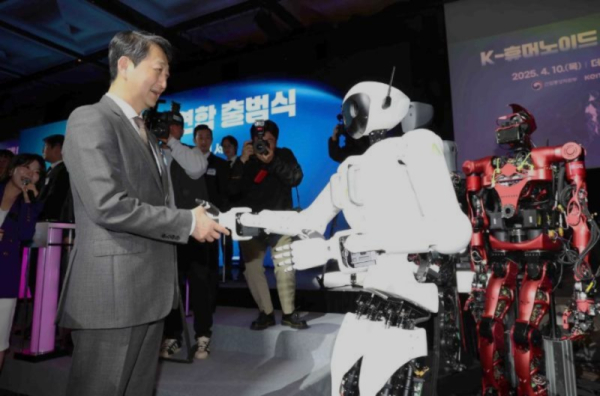
On April 10, the Ministry of Trade, Industry and Energy hosted the launch ceremony for the K-Humanoid Alliance at The Plaza Hotel in Jung-gu, Seoul. The ceremony was attended by approximately 350 officials from 40 entities, including major robotics companies such as Rainbow Robotics, Neuromeka and Doosan Robotics, as well as universities such as POSTECH, Seoul National University (SNU) and Korea University, who signed a Letter of Agreement that will bring them together with a common goal of advancing South Korea to become a global leader in the field of humanoid robotics.
The alliance’s initial task is to develop a foundation model for the “robot Artificial Intelligence (AI)” that may be utilized commonly by robot manufacturer companies by 2028. Since many humanoid companies possess core proficiencies in hardware, it has become a global trend for such companies to cooperate with AI and software developers. It has been stated that robot AI will be jointly developed by top domestic AI researchers, centered around the SNU AI Research Institute.
Minister Dukgeun Ahn, who attended the launch ceremony, emphasized the urgency and potential of the initiative: “The humanoid industry is set to grow 25-fold by 2035 – a pivotal opportunity for Korea’s manufacturing future. We must join the global race now, and the government will fully back the K-Humanoid Alliance.” The government plans to invest over 1 trillion won, focusing on R&D, mergers and acquisitions, and broader strategic initiatives.
Professor Minsu Cho of POSTECH (CSE, GSAI) has joined the alliance as a contributor in the fields of Computer Vision and Machine Learning, alongside 14 other leading scholars from top universities across the nation. These institutions are expected to receive research assignments and collaboration opportunities, driven by the industrial robot platforms currently provided by participating robotics companies.
For Postechians, the K-Humanoid Alliance represents a unique chance to lead in next-gen robotics. With faculty involvement and growing AI/robotics initiatives, students can expect increased R&D opportunities, industry collaboration, and real-world impact. As Korea aims to lead the global humanoid race, POSTECH stands at the heart of innovation, shaping the future of humanoid robotics.


